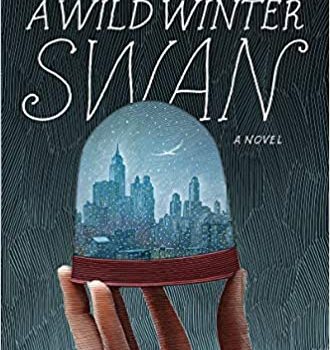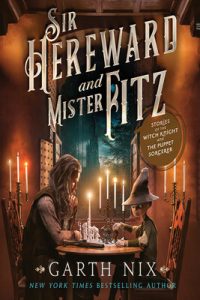Katharine Coldiron Reviews A Wild Winter Swan by Gregory Maguire
 A Wild Winter Swan, Gregory Maguire (William Morrow, 978-0-06298-078-6, $27.99, 240pp, Hardcover) October 2020.
A Wild Winter Swan, Gregory Maguire (William Morrow, 978-0-06298-078-6, $27.99, 240pp, Hardcover) October 2020.
One of the best aspects of Gregory Maguire’s work is his refusal to remove the wildness from animals, even anthropomorphized animals, in his books. Animals in his work fail to conform to human behavior and expectations in ways that are totally realistic for animals, and unheard of in Disney films and their creative descendants. Maguire continues to adhere to this choice in his new novel, A Wild Winter Swan, which takes inspiration from Hans Christian Andersen’s “The Wild Swans”. It’s a simple, straightforward book compared to some of his other work, and it’s choreographed to common storytelling beats, but the language and dialogue are extraordinarily well-tuned, and it’s a terrific outing, especially for younger readers.
In “The Wild Swans”, a girl’s brothers are transformed into swans, and she must spin nettles into thread and make them shirts in order to change them back. She succeeds, but for one sleeve of one of the shirts, given to her youngest brother, who retains one swan’s wing. In A Wild Winter Swan, that youngest boy finds his way to 1960s New York City near Christmas, where he crashes in the attic of a young woman. Laura lives with her Italian grandparents, and has just been informed she will soon be sent to boarding school in Canada. She is largely friendless, and she spends a lot of time narrating her own life inside her head. (Any bookish child, past or present, will understand this narrative mechanism instantly.) However, once the boy with the swan’s wing appears, “the storyteller inside her [is] defeated by the irruption of real story.” For the rest of the book, she shelters the boy, Hans, and keeps him away from the rest of her household. Ultimately, because he is too much swan to rejoin the human race, she makes him an artificial second wing and sends him back into the sky, hoping he’ll find his way back into his own story.
Although Maguire is capable of rendering great beauty and rich emotion, the dominant mood of this book is a kind of sitcommy zaniness, as Laura struggles to keep Hans a secret while the household prepares for an important Christmas event. This is not faint praise; it’s a fine, witty, quick-footed kind of zany. The other people in the household are colorful and meticulously characterized (Laura’s grandmother is described as “about as sentimental as it was possible for a marauding Visigoth to manage”), which is part of why the book’s occasional dips into more serious topics – the burden of being an immigrant in 1960s America, the trouble with how stories and real life tend to clash instead of following each other’s rules – work so well. All the surface conflict is diverting, but there are real issues roiling around underneath.
One major conflict, unspoken but prevalent, is Laura’s expectation that Hans will be her friend, because she is a girl with no friends in whose house a fairy-tale creature lands, and the natural order of the story would be for Hans to become her comfort and salvation. But Hans is not a friend. He’s not even human, not really; he is part wild animal, and that part drives him to say baffling things, misbehave to an outrageous degree, and remain categorically detached from Laura and her human heart. Only Maguire could render “The Wild Swans” like this.
However, unlike with his prior reinterpretations of famous stories, A Wild Winter Swan does not add much to the tradition it works with. Maguire uses Andersen’s fairy tale as a jumping-off point to tell a new, semi-contemporary story, but he doesn’t shed new light on the fairy tale, or reimagine it in a radical or postmodern way. The novel seems like a flight of fancy rather than a serious piece of work, which puts it in a different category than Mirror Mirror, for instance. However, it’s also extremely readable, and could take off with YA and younger readers.
Most significantly, A Wild Winter Swan is enjoyable, particularly to a reading writer, on a page-by-page basis. The dialogue clips along at the speed of a samba dance, and each sentence says exactly what it means to say, no more: “Everything hurt, actually, except her skin and her bones and muscles. Everything inside her was dry as old spiderweb. She was too young to feel old.” It’s a smart, funny, sweet book, slightly dark in places, even if it’s not the masterpiece Maguire is capable of writing, and it’s an especially lovely choice for family reading.
Katharine Coldiron is the author of Ceremonials (Kernpunkt Press), an SPD fiction bestseller. Her work as a book critic has appeared in The Washington Post, The Believer, The Guardian, and many other places. She lives in California and at kcoldiron.com.
This review and more like it in the January 2021 issue of Locus.
 While you are here, please take a moment to support Locus with a one-time or recurring donation. We rely on reader donations to keep the magazine and site going, and would like to keep the site paywall free, but WE NEED YOUR FINANCIAL SUPPORT to continue quality coverage of the science fiction and fantasy field.
While you are here, please take a moment to support Locus with a one-time or recurring donation. We rely on reader donations to keep the magazine and site going, and would like to keep the site paywall free, but WE NEED YOUR FINANCIAL SUPPORT to continue quality coverage of the science fiction and fantasy field.
©Locus Magazine. Copyrighted material may not be republished without permission of LSFF.








